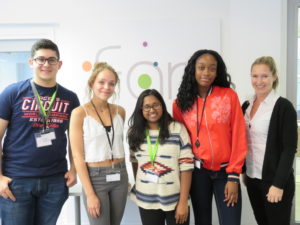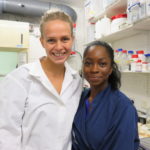in2scienceUK recently developed an “IP Scholars Programme” that’s tailored for IP Inclusive supporters and Charter signatories. Ideally, it would like to work with IP sector sponsor organisations that are prepared to pledge £4,000 to help it support an additional five young people through its innovative programme of work placements and workshops. It would be more than happy to work with these sponsors to create bespoke IP-focused workshops, which can be great for outreach and PR, not to mention a rewarding form of charitable engagement and self-development for existing staff; this is not, however, an obligation on sponsors.
So, if you’re looking for ways to develop your Corporate Social Responsibility work, take a look at the IP Scholars Programme flyer, or email Luke Mckelvey at in2scienceUK.
Meanwhile, Luke has kindly provided an introduction to the charity, which is also being published in the CIPA Journal: please read on to find out more.
An introduction to in2scienceUK, a charity that allows young people from low-income backgrounds to reach their potential and advance to STEM careers
On 24 September 2019, I had the pleasure of delivering a short pitch at IP Inclusive to discuss social mobility in IP. I discussed the important work conducted by in2scienceUK with young people from low income backgrounds and how IP professionals can champion social mobility and diversity in science, technology, engineering and maths (STEM) by supporting and taking part in the in2scienceUK programme. I was elated at the response to my pitch and it is evident that IP professionals are key advocates of programmes such as ours, which allow young people to develop their interest and passion for STEM degrees and careers.
in2scienceUK gives young people from low-income backgrounds the opportunity to work with professionals in STEM. The in2scienceUK programme provides young people with the experience, skills, and confidence they need to reach their potential and progress to STEM careers. The young people that take part in the in2scienceUK programme are recipients of free school meals, have parents with no higher education experience and live in areas in which progression to higher education is low. However, with salaries 20% higher in STEM careers compared to other sectors, the in2scienceUK programme aims to provide these young people with a better future. The in2scienceUK programme currently operates in London, Cambridge, Oxford and Exeter and will expand to Birmingham in the summer of 2020.
The in2scienceUK work-placement programme offers high-quality placements enabling participants to undertake real research and experiments with STEM professionals. The programme also includes workshops and skills days giving high-quality information and guidance on CV writing, interview and application skills which are of vital importance to the lives of every young person and are often what participants in the in2scienceUK programme lack most. We also provide educational access workshops to ensure young people can present their placement experience effectively
and construct high-quality UCAS applications.
Many of the young people that complete the work placement programme state how the experience has been truly inspiring. For example Jack, an in2scienceUK student in 2013 who now works in blood platelet research, stated that “the in2scienceUK programme gave me the competitive edge that has enabled me to succeed both at university and within my current position. I am the first in my family to go to university and I wish everyone could have the same experience I am so grateful to have had at in2scienceUK.” We are immensely proud of all of the young people that complete the in2scienceUK programme and our annual celebration event in which our students, volunteer STEM hosts and sponsors come together to acknowledge the success of our programme is a fantastic experience.

Photos courtesy of in2scienceUK

The in2scienceUK programme has had a major impact with 80% of the participating young people being accepted into university and 46% enrolling to top universities as concluded independently by UCAS STROBE. This can be compared to the national average for young people who are recipients of free school meals which stands at just 5% being accepted into university. Furthermore, every young person that takes part in the in2scienceUK programme leaves with the support networks, experience and in2scienceUK materials that they previously lacked. in2scienceUK promotes social mobility, diversity and inclusion within STEM; together we can ensure the British STEM sector reflects the youth, passion and diversity of the UK.
in2scienceUK is passionate about partnering with organisations determined to make a positive difference to the lives of young people. There are many ways to support in2scienceUK: organisations can sponsor young people through the innovative in2scienceUK programme and receive case studies of the young people they support in recognition of their generous contribution. If your organisation has STEM placement opportunities and would like to host a student for a work placement we would love to hear from you. Organisations and companies that sponsor the programme can also deliver workshops and skills days giving young people information on career pathways available to them in STEM and IP. If you would like to contribute to diversity, social mobility and inclusion in STEM please contact us and give a young person a brighter future today. Please email [email protected] for more information on how you can get involved.
Luke Mckelvey is a Development Officer at in2scienceUK.
Page published on 9th January 2020
Page last modified on 9th January 2020

